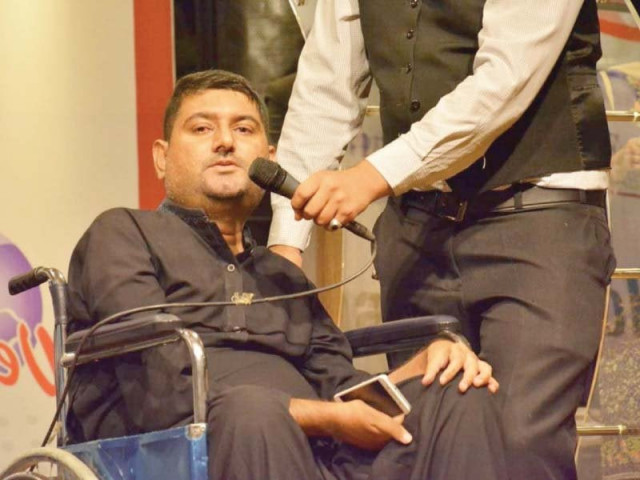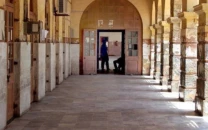One man’s quest to end disability
Wheelchair-bound activist set to launch seven-year plan to achieve goal

Wheelchair-bound activist Yasir Khan. PHOTO: EXPRESS
Armed with a laptop, 30-year-old Mohammad Yasir Khan uses his good right arm to prop up his mobile phone to coordinate with vendors, speakers and volunteers for an upcoming event in the capital.
Give us our rights, say persons with disabilities
Despite their simple surroundings, Yasir and others around him are hard at work for something which ordinary folk do not even dream about.
Yasir suffers from the Anterior Horn Cell — a motor neuron disorder (MNDs), a debilitating disease similar to the one which British physicist Stephen Hawking suffers from —which has confined him to a wheelchair and paralysed one of his hands.
But he was not always like this. A younger Yasir was like normal children and used to play with other kids in his neighbourhood. But with the disease afflicting his family, including his older brother, his condition deteriorated gradually and eventually forcing him to leave school soon after he completed his primary education.
With no guidance on his condition or how to cope with it, Yasir struggled to strike a balance, his strong urge to be self-reliant continued to drive him, finding ways and means to live with his condition and to overcome it.
While he could not manage to appear for the expensive Cambridge and other business exams, his resolve did not stop him from studying their courses and learning all that he could.
He also tried his hand at various businesses and even tried working for various non-governmental organizations, working for differently abled people. But they all disappointed him and only served to convince him to do something else.
“The other organizations, I felt, were selling disability by taking funds and just distributing some wheelchairs before the media. Neither the government nor these organizations did anything for either curing diseases or for making the differently abled a part of the society,” Yasir said.
In fact, Yasir believes that educational institutions which solely focus on special education seek to exclude, rather than include differently abled people.
“By sending differently abled people to special education institutes means labelling them as disabled,” he explained. “It means they come from a different world. If they have not learnt to survive with normal people by studying with them, how can they survive with them in the practical life, in offices,” he asked.
Moreover, he believes disability is a feeling, an attitude.
“The first condition to be normal is to think that you are normal. If you think you are disabled, you are and if you do not think this way you are not,” Yasir explained as he manages to type away on his laptop with one hand.
“I have never accepted disability. Those who accept disability, lose their will to fight. So, I will always be fighting against disability until it is eliminated.”
Indeed, his passion to help bring the differently abled into the mainstream led him to study new researchers around the world. Despite having never walked through the gates of a university as a student, this self-taught activist frequently delivers lectures at higher learning institutions on technology and recent trends in research.
In 2010, he set up the STRIVE Trust which was dedicated to working on neurological disorders for improving the quality of life of differently abled people and to facilitate them through research, treatment and rehabilitation.
‘Pakistan needs to change its disability laws’
Due to a dearth of funding and availability of like-minded human resources, the trust worked by providing physiotherapy facilities to patients and providing them with assistive equipment.
But slowly, the trust managed to work towards Yasir’s ultimate goal.
The trust will be launching a policy to help end disability by 2025. The aim of the policy is to promote research for new projects like stem cells, 3-D bioprinting, exoskeletons and using artificial intelligence to find ways and means to cure and end disability.
Published in The Express Tribune, January 6th, 2018.



















COMMENTS
Comments are moderated and generally will be posted if they are on-topic and not abusive.
For more information, please see our Comments FAQ